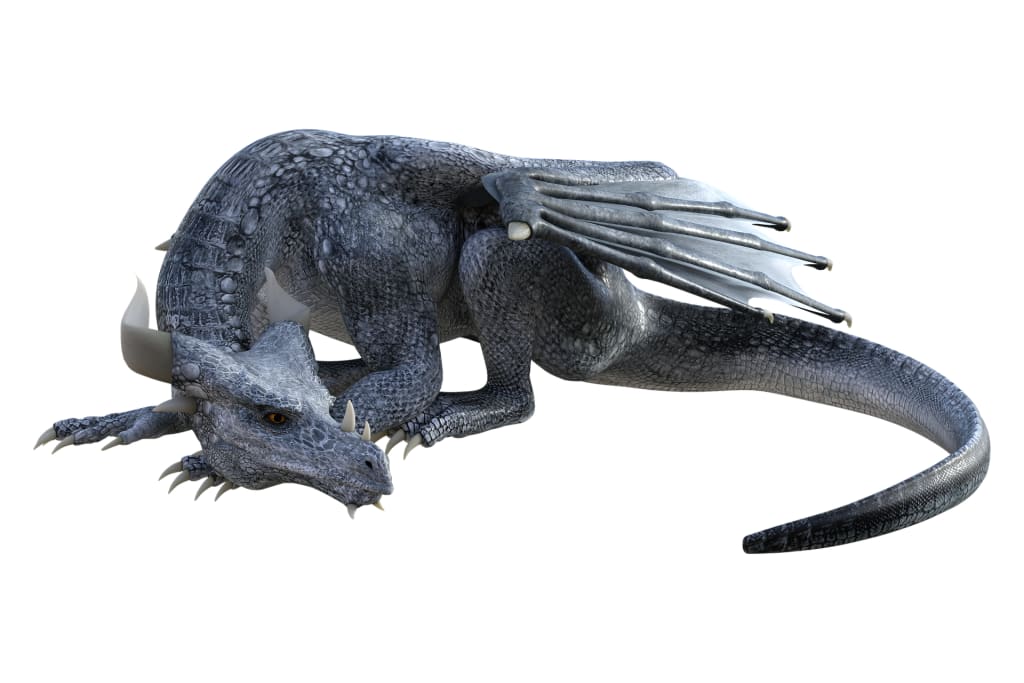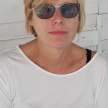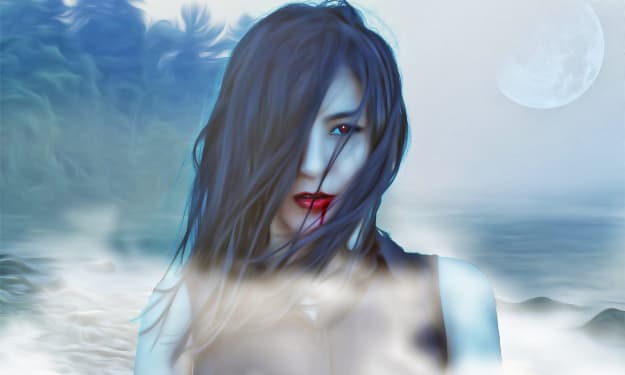An excerpt from "The Flight of the Serpent Dragon"
A fantasy novel: incipit

An excerpt from “Flight of the Serpent Dragon” by Patrizia Poli
A wound in the red rock. An ocher mouth open in the blue of a sky that knows no clouds: the Ohnigah Mountain chain that splits in two before descending to the stony ground, the mountains dug by the dry Egelloch river bed. On both sides of the dry river bed, the palm grove, an emerald ribbon in a universe of red earth.
It is all that Ahnu knows of the world, only her oasis in the desert mountain, a small spring enclosed in the heart of the palm grove. During the long, hot summer months, that’s all her water, murky and muddy, but water all the same. A man takes turns guarding the pool, from which only a few buckets can be drawn per day, three for the Ohnigah and one for the Somiah herdsmen.
The man who raised her told her that her father died in battle, entrusting her to him, miserable shepherd Somiah among the poorest of the village as he is. Every day the silent man takes his sheep to the edge of the oasis. They walk with bowed heads, grazing sparse blades of grass in the dust. The camel goes a little further and with its nose moves the stones to tear off blades of dry grass, followed by the tired but never distracted gaze of the shepherd, who gnaws on dates spitting pits into the sand.
Ahnu stays all day alone in the hut, a round wall of straw and mud covered with palm leaves. Every morning she draws her bucket from the puddle, trying not to spill a drop. Her hands barely hold the container, while the other girls, with shiny and dark skin, enjoy pushing her. She tries not to lose her balance, until she sees, helplessly, the water swinging in the bucket, overflowing, spilling onto the thirsty dust. There, where previously a swirl of wet sand had been created, only a damp patch remains. She raises her eyes, fixes them on those of the other girls and an icy fury mounts inside her. She would like to kill them, clasp her own hands around their necks, make their white and malevolent eyes bulge. Instead, she returns home with an empty bucket. She knows he will scold her, but she doesn’t cry. Mute and obstinate she goes to collect the dates, then she prepares the cheeses which she encloses in straw canisters. A white veil of dust covers all things and stands out against the black skin of the children, whose nostrils are encrusted with flies. Mothers know that a first crust of dead insects protects their children from the onslaught of living ones. Ahnu tries to defend her cheeses by waving palm leaves, while the children roll around in the sand laughing and the old men squat chatting.
In the evening, when the sun evaporates behind the palms, she weaves baskets in solitude, in front of the door of the hut, hoping that the man who raised her will return as late as possible or never return.
The flame flickers with long yellow-orange tongues from the beaten earth, the light spreads to illuminate the walls of the immense fortress. A sentry crouched in a corner stares distractedly at the glow.
In the heart of the flame, a little girl weaves palm baskets. She has light hair, feet wrapped in camel skins.
«Go to her.»
The voice echoes in the huge vault, the cloaked figure disappears into a dark side corridor. The sentry gets up and closes the wooden door that his master has passed through.
In front of the flame, only a strange creature remains, which looks perplexed at the dissolving female image.
The man herds the sheep into the paddock behind the hut and ties up the camel under a palm tree. Ahnu leaves the basket and, unconcerned, enters the house. He can see her bent over the earthenware bowls and little baskets of brown dates. She’s growing up, he thinks, too fast.
This evening he feels more tired than usual. He has grown old without ever being able to make himself loved by her. They have lived together since the moon-skinned woman died, leaving a pale child in his arms, her inquisitive eyes wide open on a hostile world. He called her Ahnu, date, a common name among palm grove pickers, and she grew up as hard as a stone and stubborn as a wayward camel. It’s better this way, a thousand times better this way, better that she just calls him “shepherd”, that she doesn’t talk to him, that she doesn’t miss him when he’s out with the flock.
The man eats his dinner of dates and cheese, then stretches out on the blanket. His eyes feel heavy and his limbs ache, but sleep is slow to come. Work seems increasingly tiring to him, the night cold has rusted him and his beard is white, the puddle of his days is about to dry up and the sand will soon cover his bones, he is as certain of this as he is that waking up he will find the sun again and the dusty palms around the hut.
He can’t leave Ahnu alone in this world, he repeats himself turning over on the hard ground, he absolutely has to make a decision, before it’s too late.
The breeze has died down and the sun is already pitilessly burning half the sky. The flies are swarming around the cheeses with their lewd buzzing. Ahnu models a clay vase, his white hands sunk in the putrescent green of the antimony with which the earth of her valleys is impregnated. She thinks about life, she knows she’s alone in the world, she knows she’ll never be like other girls. She hasn’t asked the man who raised her why her skin is so white, why her hair is as pale as withered grass, but she is certain that no one likes her. She feels it from how they look at her, from how they whisper, from how they nudge her when he is close to her and from how, then, they attack her if he is not there. The women make strange incantatory signs as she passes. The children stick out her tongue, the old men observe her from afar. Nobody wants her next to them and she doesn’t want anyone next to her. The once suffered loneliness is now her most trusted companion.
She raises her head because something is watching her. Two eyes shine pale among the green of the palms. Ahnu stiffens, leaps to her feet, backs away. She is still small but she has learned to be alert, it was the man who raised her to teach that to her, with his gaze, with the posture of his body, with hisses and nods.
A snout peeks out from among her leaves. The creature resembles a reptile, but has small wings just hinted at on its back and translucent scutes like fish scales. He talks to her.
«I have news for you» he says softly, through a mouth full of sharp teeth, and meanwhile wags his tail like a nervous feline, «my master announces that you will have necklaces of yellow amber, khol for your eyes and flowers of hibiscus for your hair.»
Ahnu has finished backing away, now there is no more space, she leans against the trunk of a palm tree, she has too many questions screaming in her throat. But the little wings flap, the creature takes off in a low, grazing flight, which flays trunks and drops dates to the ground. It still hasn’t disappeared and she already wonders if there isn’t another life outside the edge of the palm grove, if it flows only on the rhythms of the Egelloch and on the birth of lambs. She smells the hands that taste like rennet, she wonders what is this pain that explodes inside her. There is no longer a trace of the creature, only the dazzling heat of the dusty yard remains, the stench of dates rotting in the sun and the excrement of men and flocks.
In the heart of the fortress, the Spirit of the Desert nods in satisfaction. The only person in the world who can do what he wants is giving him his soul and his will.
He woke her up when the purple clay mountains burned with the rays of the first sun. «I feel my strength ebbing» he told her. She saw him shiver in the heat, as if a cold hand ran through his tired limbs. «Get on the camel» he ordered her. He’s never brutal, but he’s never kind either.
«Do you want to sell me, shepherd?»
«No.»
Now they are coming out of the palm grove. «He takes her away» she hears the women whisper while filling their buckets. They have dull, mean eyes fixed on her. On the sides of the path that leads out of the oasis, the rough trunks of her palms stand out. The ground, strewn with dried stones and excrement, exhales an unpleasant smell.
The universe is flat and always the same, thinks Ahnu.
But then she’s out.
The morning light dazzles her, the glare is so strong that it prevents her from looking. Yet she lifts her head, incredulous, no longer protected by the foliage. The intense cobalt of the sky pours over her, who has always seen the vault in segments, in diurnal and nocturnal gleams. She thinks she’s drowning and instead she’s just looking at the desert beyond the palm grove: an immense expanse of sand, dotted with stones. Around her, as far as the eye can see, the border of nothingness: the horizon of the mountains that flicker in the blue, with the vermilion peaks beaten by the wind. For the first time, she understands what freedom can be.
The shepherd guides the camel along the dry bed of the Egelloch. Rare ponds stagnate at the edges of the clay bottom, surrounded by bushes greedy for water. Now she can see from outside the palm grove, under whose fronds she lived, sheltered and at the same time suffocated: it is a green ribbon, uniform and shiny.
Suddenly the man, who is following a path known only to him, turns and sets off in the direction of the mountains. Some sparse fortified kasbah glows scarlet in the sun. The Ohnigah Mountains appear close together in the great expanse and the peaks form an unbroken range. The shepherd is silent, concentrated in the effort to walk. The track marked by sharp stones begins to climb along a slope, the path becomes steeper, the man gasps, coughs, spits. She is indifferent to his suffering as they carry on in the unbearable heat. Sweat evaporates quickly, leaving the skin dry and hot. Thirst is not quenched, the legs stick to the dirty fur of the camel, the parasites bite into her flesh.
They gnaw on some dates and suck some water along the way, without stopping.
After a few hours, Ahnu’s back is broken, and the man looks exhausted. She knows that asking him is useless, he hasn’t answered her when she was a child, perhaps he has never even listened to her. So she talks to herself, as she has learned to do in the long days of solitude, she looks for the reason for that trip, she wants to go back in memory, but she has no memories. She doesn’t know who her father and mother were, she doesn’t know other faces than those of the people who live in the oasis perhaps left forever. She thinks back to the creature with small wings and sharp teeth. Restlessness is a blade that pierces the chest.
Finally the shadows lengthen, down in the valley, and the walls of the mountains are tinged with a purplish reflection. The man agrees to a brief stop, during which they drink again. Her throat is parched, the words, if they came out, would be dry with dust, but they don’t come out, neither of them speaks. The bare slope on which they climbed is now all in the shade, a few gusts of evening breeze freeze the sweat on their broken backs and glue their clothes on. The man now seems to have grown old, breathlessness prevents him from breathing. «Let’s continue our journey» he says, «darkness here falls suddenly, as if the fires of the palm groves ceased to burn all together». So they set off again, she lolling, he with his back bent and one hand clutching the hairy neck of the camel.
Suddenly Ahnu is afraid of the shadows, of the dark and echoing mountains, of the snakes that slip between the camel’s legs, of the stones that roll down the ravine. «Shepherd, you’ll kill yourself!» No, it is for him that she is afraid. He is like the rocks, he is like the spring in the center of the oasis: she doesn’t love him but she can’t imagine him dying. She hopes that the climb ends soon, that he can rest.
The afterglow is fading on the crests of the Ohnigahs when Ahnu, sleepy and wavering, raises her head and looks down the gray stony path they are walking along. A little below the summit lies a vast plateau, which wedges itself like a valley between the peaks. In front of them, close to the rocky wall, where the path dissolves into the plateau, she can see a small house of dark stones.
A wisp of smoke comes out of the roof.
About the Creator
Patrizia Poli
Patrizia Poli was born in Livorno in 1961. Writer of fiction and blogger, she published seven novels.
Enjoyed the story? Support the Creator.
Subscribe for free to receive all their stories in your feed. You could also pledge your support or give them a one-off tip, letting them know you appreciate their work.






Comments
There are no comments for this story
Be the first to respond and start the conversation.